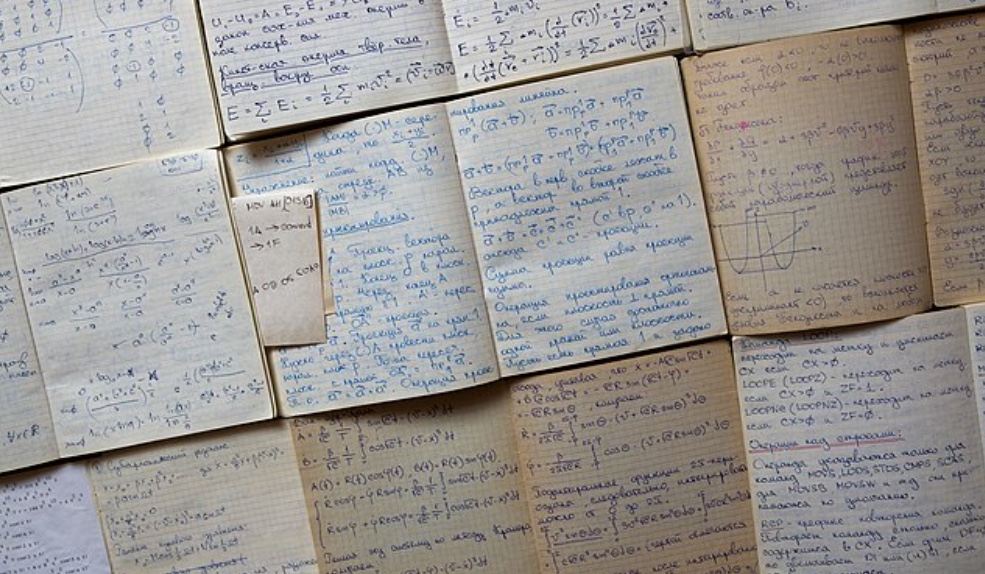The Middle East and the Foundations of Algebra

By: Fedal Hanoun / Arab America Contributing Writer
Many Westerners mistakenly believe that ancient Greeks and thinkers like Descartes were the first to use algebra, but few know that the word “algebra” itself is Arabic. During the Islamic Golden Age (8th–14th centuries), mathematicians from the Middle East laid the groundwork for algebra by developing the notations, methods, and ideas that are used today. Regardless, mainstream narratives often fail to acknowledge their achievements, which leaves a hole in our knowledge of mathematics’ past.
Where Algebra Began in the Middle East
Al-Khwarizmi, a Persian mathematician who lived around 820 CE, authored a book titled Kitab al-Jabr wa’l-Muqabala, which translates to “The Compendious Book on Calculation by Completion and Balancing.” The Arabic phrase al-jabr is the origin of the word algebra. A scholar in Baghdad’s House of Wisdom, Al-Khwarizmi is sometimes called the “father of algebra” for the methodical way he solved quadratic and linear equations. Instead of seeing algebra as merely an extension of arithmetic, his work established it as an abstract, methodical subject by providing general methods for solving different kinds of equations.
As a result of Al-Khwarizmi’s contributions, algebra was able to establish itself as a universal language of mathematics. His techniques, which are still used in modern high school algebra classrooms, involve balancing equations by transferring terms from one side to the other; this is called al-jabr. By combining a symbolic approach with a procedural one, mathematics becomes a universal tool for addressing problems in disciplines as diverse as engineering and astronomy.
Algebra from the Middle East and Its Dispersal to Europe
In the 12th century, intellectuals like Leonardo of Pisa, better known as Fibonacci, were affected by Al-Khwarizmi’s work that had made its way to Europe through translations and exchanges. Arabic numbers were more flexible than Roman numerals at the period, and Fibonacci’s Liber Abaci brought many of Al-Khwarizmi’s concepts to a European audience, including methods for solving quadratic equations. References to the original sources progressively lost as Europe built its algebra on top of this Middle Eastern mathematical expertise.
Another important figure is the Persian genius Omar Khayyam, who explored cubic equations and made great strides in mathematics. He came up with a novel and advanced idea for solving cubic equations: a way for geometrically approximating answers. Although he established the framework for subsequent research in polynomial equations, Khayyam’s contributions remain unacknowledged in algebra’s historical histories, despite his profound impact on the field.
For What Reasons are these Contributions Disregarded?
Eurocentrism has long influenced scholarly and popular narratives, which contributes to the lack of appreciation of Middle Eastern algebraic contributions. Scholars from Europe frequently put their own intellectual accomplishments ahead of those from other civilizations throughout the Renaissance. Because of this bias, non-Western perspectives, especially those from the Islamic world, were downplayed. The original writers of Middle Eastern literature were gradually erased from mathematical history due to scholars’ failure to properly cite their works, despite the fact that they translated and employed these texts.
The widespread misunderstanding that the Middle Ages—the “Dark Ages” in Europe—were a time when no one made any significant intellectual strides forward is another contributing element. Actually, this was the heyday of the Islamic Golden Age, when great mathematical, medicinal, astronomical, and philosophical works were being produced. The important contributions of Middle Eastern intellectuals to disciplines like algebra go unrecognized due to a general ignorance of the period’s accomplishments.

Middle Eastern Algebra’s Lasting Impression on the World
The inputs of the Middle East to algebra are deeply ingrained in modern mathematics, notwithstanding these omissions. Algorithm, derived from Al-Khwarizmi’s name, is one modern word that harkens back to the Middle Eastern origins of computer mathematics and algebra. Unfortunately, many Middle Eastern mathematical ideas and procedures are taught without recognizing their cultural and historical roots.
A growing number of historians and educators are calling for math curricula that are more inclusive and give credit where credit is due: to people all across the world. In addition to being historically correct, showcasing Middle Eastern accomplishments helps paint a fuller picture of algebra’s evolution as a cross-cultural field of study. In doing so, they help students see mathematics as a language that transcends cultures and ideologies.
Conclusion
Algebra has been profoundly influenced by the Middle East, which has helped to shape the field and pave the way for contemporary science and engineering. Al-Khwarizmi and Omar Khayyam are deserving of attention for their significant contributions to the history of algebra. By accepting a more comprehensive history of algebra, we pay tribute to the Middle Eastern scholars whose contributions to the field have had and will continue to have an impact on our daily lives.
Check out our Blog here!








